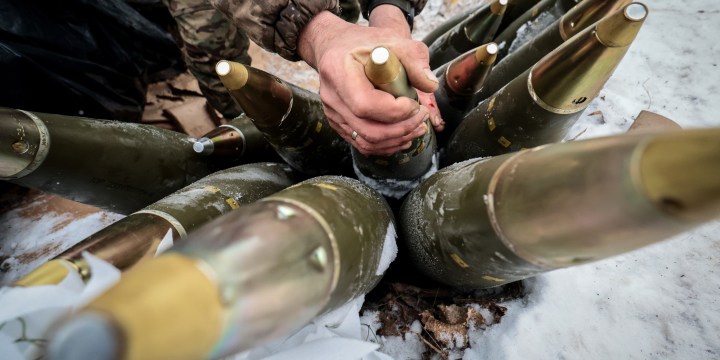UKRAINE UPDATE: 29 JANUARY 2024
Kyiv foils $40m artillery shell embezzlement scam; Zelensky reveals income in transparency bid

Ukraine suspects five people of embezzling $40m earmarked for artillery shells for the country’s ammunition-starved army as the war with Russia approaches a third year.
Ukrainian President Volodymyr Zelensky declared his personal income for the first time since the outbreak of war with Russia, as part of his effort to increase transparency in his government.
A missile attack on Friday on a tanker taking Russian fuel through the Gulf of Aden may prove to be a defining moment for an oil market that had previously been somewhat immune to months of Houthi militants’ attacks on merchant trade.
Ukraine foils $40m artillery shell embezzlement scam
Ukraine suspects five people of embezzling $40-million earmarked for artillery shells for the country’s ammunition-starved army as the war with Russia approaches a third year.
The group, including high-ranking former and current Defence Ministry officials and businessmen, is suspected of taking nearly 1.5 billion hryvnia ($40-million) of state money without supplying any of the 100,000 mortar shells in a contract with the military, the Security Service of Ukraine said in a statement on its website late on Saturday.
The new case is the latest in a string of military procurement scandals that are undermining the Zelensky government’s efforts to weed out military-linked graft and comes at a time when Western backers are increasingly split over future aid to the country.
Zelensky releases personal income in transparency push
Volodymyr Zelensky declared his personal income for the first time since the outbreak of war with Russia, as part of his effort to increase transparency in his government.
In 2021, the year before Russia invaded Ukraine, Zelensky and his family reported income of 10.8 million hryvnia ($285,000), down by 12 million hryvnia from the previous year, even as his income was boosted by the sale of $142,000 of government bonds, according to a statement on his website.
In 2022, the first year of the Russian invasion, the Zelensky family’s income fell further to 3.7 million hryvnia as he earned less income from renting real estate he owned because of the hostilities.
Even as the war allowed Ukrainian officials to withhold revealing sensitive personal information, Zelensky pushed to make them publicly declare assets. Increasing transparency and tackling graft are necessary for his country to ensure continued financial aid from its Western allies, even as more than $100-billion of funds are held up due to political manoeuvring inside the US and EU.
Zelensky earned far more before entering politics when he was a popular television entertainer and ran a major production company.
Warning to exiled Putin critics as rockers face deportation
Members of a self-exiled Russian rock group known for opposing Moscow’s war in Ukraine face possible deportation home after being arrested in Thailand for breaking immigration rules.
Russian Foreign Ministry spokesperson Maria Zakharova on Saturday accused them of sponsoring terrorism by publicly supporting Ukraine, raising concerns they may face criminal charges in Russia. The Russian consul in Phuket said that they’ll be sent to Bangkok for deportation based on their citizenship.
With four members of the Bi-2 band holding Israeli passports — including one who is also an Australian citizen — the issue has become a diplomatic headache for Thai authorities and is likely to alarm Kremlin opponents who fled abroad. Russian artists critical of the government have encountered increasing difficulties in performing overseas, with opponents of President Vladimir Putin alleging a campaign to intimidate and silence them.
Since his invasion of Ukraine, Putin has waged an unprecedented crackdown on dissent, jailing or driving his critics into exile. An estimated one million Russians left the country in 2022 and 2023, including some prominent anti-war cultural figures, in the largest brain drain since the collapse of the Soviet Union.
Five of the seven Bi-2 members who were detained on 24 January on the Thai resort island of Phuket for holding two concerts without a work visa are Russian citizens. Their manager said Sunday they were already on their way to the Thai capital by bus. The musicians feared they had been targeted for their anti-war stance, according to their defence team.
Maxim Galkin, a comedian now based in Israel, said he was barred from entering the Indonesian island of Bali for a planned show on Saturday despite having received a work visa two days before. Galkin, whose shows in Thailand were recently cancelled by owners of the venues, said on Instagram that passport officers in Bali showed him a letter from the Russian government requesting Indonesia keep him out of the country.
Galkin was fined 100,000 dirhams ($27,225) by the United Arab Emirates over a performance in Dubai in which he proclaimed support for Ukraine, according to the Mash Telegram channel. Russian rap musician Alisher Morgenshtern has said on social media that the Arab country has imposed an entry ban on him.
Moscow has declared the lead singer of Bi-2, Galkin and Morgenshtern as “foreign agents.”
Houthi hit on Russian fuel has oil traders recalculating risks
A missile attack on Friday on a tanker taking Russian fuel through the Gulf of Aden may prove to be a defining moment for an oil market that had previously been somewhat immune to months of Houthi militants’ attacks on merchant trade.
Why the calm? Because much of the oil flowing through the Red Sea and Suez Canal came from Russia and — so the theory went — it might be safe. The Houthis themselves signalled that Russian ships had nothing to fear, and Moscow is an ally of their sponsor Iran. Oil tankers generally had been largely spared.
But Friday’s attack made one thing clear: whatever assurances Yemen’s Houthis offer, they don’t extend to a ship’s cargo if the vessel itself has even a tenuous link to the US, UK or Israel. The Houthis had said they were targeting Israeli assets because of the war in Gaza, and then extended their reach to US and UK vessels after those countries launched airstrikes in Yemen.
The attack means that a greater slice of the three million barrels a day of Russian crude oil and fuel that have been flowing through the Red Sea to reach customers in Asia could be at risk. And Russian volumes matter to the global market — despite sanctions imposed because of Moscow’s war in Ukraine.
US fires on Houthi missile hours after Trafigura ship attack
US Navy ships fired on a Houthi anti-ship missile in Yemen hours after a tanker operated on behalf of trading giant Trafigura Group carrying a cargo of Russian fuel was hit in the most significant attack yet by the rebel group on an oil-carrying vessel.
US Central Command said the Houthi missile was prepared to launch and posed an “imminent threat” to shipping in the area. US forces destroyed the missile, Centcom said on X.
The US strike came hours after the Houthi rebels claimed the missile attack on the Marlin Luanda. The vessel was carrying Russian-origin naphtha — a product used to make plastics and gasoline — purchased below the price cap imposed by the Group of Seven nations, a Trafigura spokesperson said on Friday.
“All crew on board the Marlin Luanda are safe and the fire in the cargo tank has been fully extinguished,” the company said in a statement on its website. “The vessel is now sailing towards a safe harbour.”
No other ships operating on behalf of Trafigura were in the Gulf of Aden and “we continue to assess carefully the risks involved in any voyage”, according to the company.
Chinese engineers keep Russia’s metal furnaces firing
Magnitogorsk, in the Ural mountains, was developed as a symbol of Soviet industrial might and its capacity for economic modernisation. Today, a new, 75 billion-rouble (roughly $840-million) coking plant in the steel town is being built by a Chinese engineering giant and hundreds of Chinese workers.
The contract between Magnitogorsk Iron & Steel Works, known as MMK, and state-owned Sinosteel Engineering & Technology Co. was signed before Russia’s invasion of Ukraine and links between the two predate that. But since Chinese engineers and builders began arriving in large numbers to speed up construction last year, the project has been trumpeted by officials on both sides as emblematic of closer ties.
A hefty investment when compared to most past Chinese activity in Russia, Magnitogorsk is just one of dozens of examples from across the country of Beijing’s engineers and machines keeping Russian heavy industry alive. It’s a trend that owes much to China’s technological prowess, but also to overcapacity at home and to Moscow’s urgent need to keep producing the iron and steel its wartime economy requires.
With few choices for Russia, bonds are strengthening. Beyond the Urals, the country’s biggest mining company, Norilsk Nickel, turned to China for help on a sulfur dioxide emissions-capture operation after European contractors stepped away in 2022, with the project still incomplete. Steelmaker Severstal has just signed up a Chinese equipment supplier for a $1-billion iron ore processing plant.
“For Russia, Chinese equipment supply is a necessity now, as there is no alternative,” said Alexander Gabuev, the director of the Carnegie Russia Eurasia Center. “China has a broad range of equipment. Most of the time it is not worse than other offerings and sometimes it is quite innovative.” DM




Comments - Please login in order to comment.